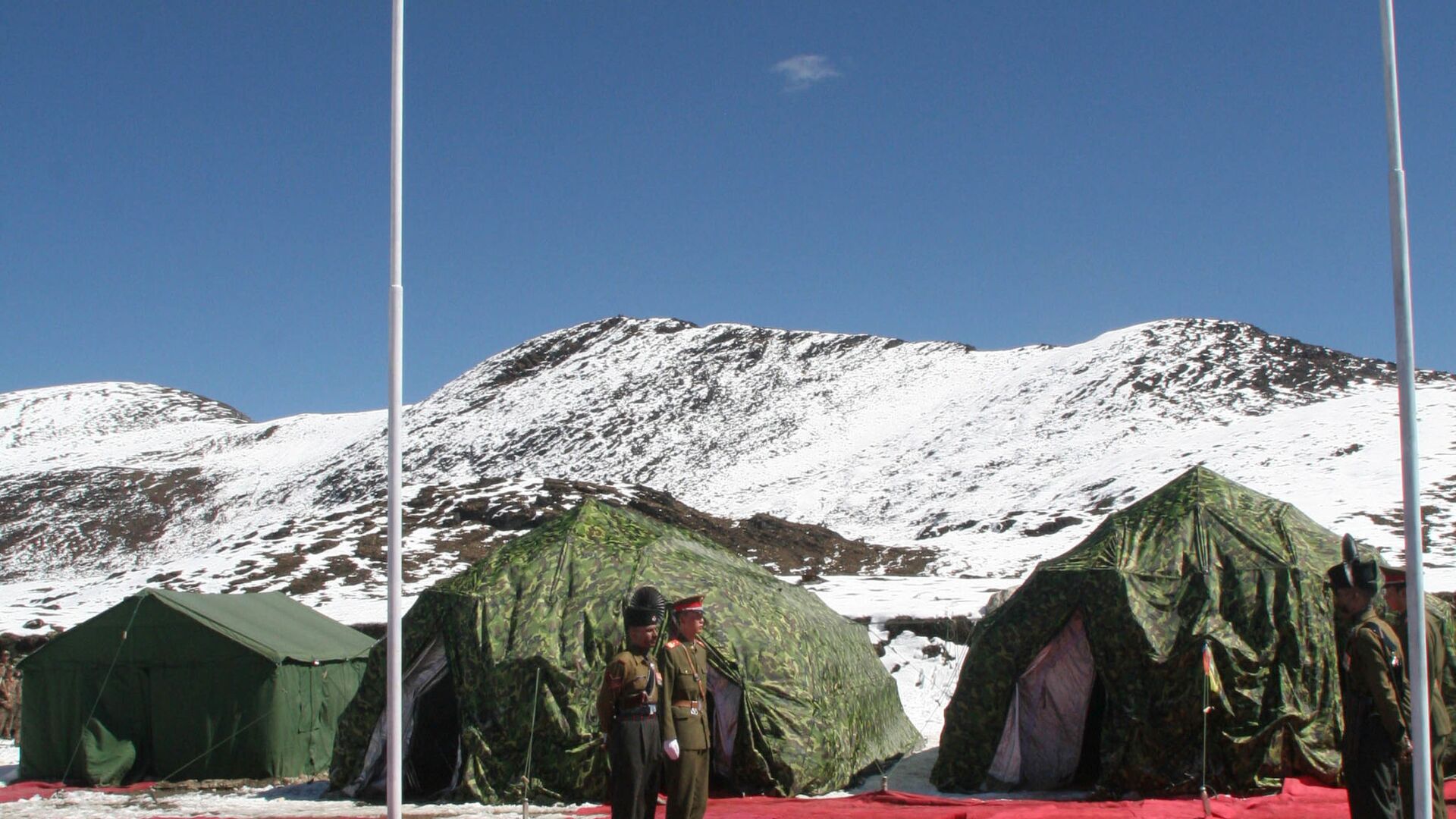https://sputnikglobe.com/20210715/india-china-at-loggerheads-over-last-years-deadly-border-clashes-1083391171.html
India, China at Loggerheads Over Last Year's Deadly Border Clashes
India, China at Loggerheads Over Last Year's Deadly Border Clashes
Sputnik International
Chinese and Indian troops were locked in conflict a year ago near the Pangong Lake in Ladakh, leading to casualties on both sides. The two countries which... 15.07.2021, Sputnik International
2021-07-15T15:39+0000
2021-07-15T15:39+0000
2022-07-19T10:37+0000
world
newsfeed
wang yi
china
ladakh standoff
indian foreign ministry
chinese foreign ministry
https://cdn1.img.sputnikglobe.com/img/07e4/09/0f/1080460951_0:960:2048:2112_1920x0_80_0_0_100c30f1c69007ee3a6c1dd48ca0f1b5.jpg
Chinese Foreign Minister Wang Yi has told his Indian counterpart Subrahmanyam Jaishankar "that the rights and wrongs of what happened at the China-India border area last year are clear and the responsibility does not lie with the Chinese side", according to an official statement from China on Thursday.The Chinese Foreign Ministry issued the statement a day after the two ministers met for an hour-long meeting on Wednesday, on the sidelines of Shanghai Cooperation Organisation Conclave in Tajikistan's capital Dushanbe.During the meeting, Jaishankar also conveyed to his Chinese counterpart that India would not accept a unilateral change in the status quo along the Line of Actual Control (LAC). According to the Chinese ministry, Minister Yang has also told his Indian counterpart in Dushanbe that "China is ready to find a solution acceptable to both sides on the issue that needs emergency response through negotiation and consultation."The Indian government recently accused China for "disturbing" the peace and tranquility at the border by amassing a huge number of troops in violation of bilateral pacts. During the talks in Dushanbe, the Indian minister stated that a prolongation of the existing situation was not in the interests of either side and that it was "visibly affecting the relationship in a negative manner".His Chinese counterpart Wang Yi said that "the two sides must place the border issue in an appropriate position in bilateral relations, expand the positive momentum of bilateral cooperation and create favorable conditions for resolving differences through negotiation". Stressing the need to maintain peace, the Chinese minister said: "China and India pose no threat but offer development opportunities to each other. The two countries are partners rather than rivals or enemies."It was the first in-person meeting between the two ministers after their talks in Moscow on the sidelines of an SCO Conclave.
china
ladakh standoff
Sputnik International
feedback@sputniknews.com
+74956456601
MIA „Rosiya Segodnya“
2021
Priya Yadav
https://cdn1.img.sputnikglobe.com/img/07e5/02/01/1081944855_0:29:2048:2077_100x100_80_0_0_fcca548f1670eac15afebf8b8e336044.jpg
Priya Yadav
https://cdn1.img.sputnikglobe.com/img/07e5/02/01/1081944855_0:29:2048:2077_100x100_80_0_0_fcca548f1670eac15afebf8b8e336044.jpg
News
en_EN
Sputnik International
feedback@sputniknews.com
+74956456601
MIA „Rosiya Segodnya“
Sputnik International
feedback@sputniknews.com
+74956456601
MIA „Rosiya Segodnya“
Priya Yadav
https://cdn1.img.sputnikglobe.com/img/07e5/02/01/1081944855_0:29:2048:2077_100x100_80_0_0_fcca548f1670eac15afebf8b8e336044.jpg
newsfeed, wang yi, china, ladakh standoff, indian foreign ministry, chinese foreign ministry
newsfeed, wang yi, china, ladakh standoff, indian foreign ministry, chinese foreign ministry
India, China at Loggerheads Over Last Year's Deadly Border Clashes
15:39 GMT 15.07.2021 (Updated: 10:37 GMT 19.07.2022) Chinese and Indian troops were locked in conflict a year ago near the Pangong Lake in Ladakh, leading to casualties on both sides. The two countries which share a border have been trying to de-escalate troops from sensitive areas amid a fierce blame game. Each accuses the other of transgression on the 4,057km Line of Actual Control (LAC).
Chinese Foreign Minister Wang Yi has told his Indian counterpart Subrahmanyam Jaishankar "that the rights and wrongs of what happened at the China-
India border area last year are clear and the responsibility does not lie with the Chinese side", according to an official statement from China on Thursday
.The Chinese Foreign Ministry issued the statement a day after the two ministers met for an hour-long meeting on Wednesday, on the sidelines of Shanghai Cooperation Organisation Conclave in Tajikistan's capital Dushanbe.
During the meeting, Jaishankar also conveyed to his Chinese counterpart that India would not accept a unilateral change in the status quo along the Line of Actual Control (LAC).
According to the Chinese ministry, Minister Yang has also told his Indian counterpart in Dushanbe that "China is ready to find a solution acceptable to both sides on the issue that needs emergency response through negotiation and consultation."
The Indian government recently accused China for "disturbing" the peace and tranquility at the border by amassing a huge number of troops in violation of bilateral pacts.
During the talks in Dushanbe, the Indian minister stated that a prolongation of the existing situation was not in the interests of either side and that it was "visibly affecting the relationship in a negative manner".
His Chinese counterpart Wang Yi said that "the two sides must place the border issue in an appropriate position in bilateral relations, expand the positive momentum of bilateral cooperation and create favorable conditions for resolving differences through negotiation".
The Chinese Ministry added: "Wang Yi said that after the two foreign ministers' meeting in Moscow in September last year, the frontier troops of both countries disengaged in the Galwan Valley and the Pangong Lake areas, and the overall situation in the border area was de-escalated. Meanwhile, relations between China and India are still at a low level, which is not in the interest of either side."
Stressing the need to maintain peace, the Chinese minister said: "China and India pose no threat but offer development opportunities to each other. The two countries are partners rather than rivals or enemies."
"The principles of China-India relations should still be mutual respect for sovereignty and territorial integrity, mutual non-aggression, non-interference in each other's internal affairs," the Chinese Minister stated.
It was the first in-person meeting between the two ministers after their talks in Moscow on the sidelines of an SCO Conclave.





